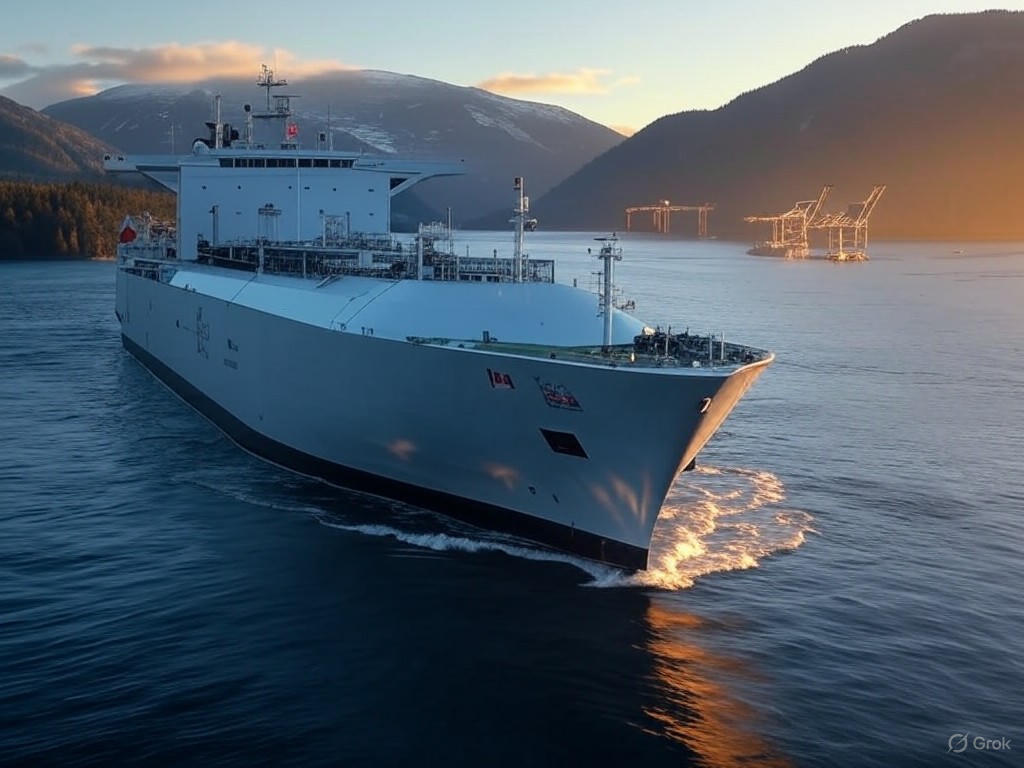BC’s LNG Exports: A Strategic Global Response
In an era where global trade resembles a high-stakes poker game, with tariffs flying like wild cards and supply chains twisting in the wind, British Columbia’s burgeoning liquefied natural gas (LNG) exports stand as a shrewd play. As nations grapple with the fallout from ongoing trade wars, particularly those echoing from the U.S.-China standoff, Canada’s western province offers a model of economic resilience. By funneling LNG to Asia, BC not only bolsters its own coffers but also provides a stabilizing force in volatile markets. Yet, this strategy must navigate the choppy waters of environmental stewardship and Indigenous rights, all while championing free-market principles over heavy-handed government meddling. As Marcus Twyne, I see this not as a panacea, but as a pragmatic reminder that true progress often lies in unleashing enterprise rather than tethering it with red tape.
The Economic Imperative: Countering Trade Pressures Through Free-Market Ingenuity
British Columbia’s LNG exports represent a timely riposte to the global trade frictions that have upended traditional supply chains. In the shadow of the U.S.-China trade war, which has seen tariffs balloon and energy dependencies shift, Asia’s hunger for reliable energy sources has only intensified. Countries like Japan, South Korea, and increasingly China seek alternatives to coal and unstable imports, making BC’s LNG a welcome ally. This isn’t mere opportunism; it’s a testament to the free market’s ability to adapt and thrive amid chaos.
Consider the economic gains: The development of projects like the Coastal GasLink pipeline and the LNG Canada facility has injected billions into BC’s economy, creating thousands of jobs in construction, engineering, and operations. According to a report from the Wall Street Journal, these exports could add upwards of $40 billion to Canada’s GDP over the next two decades, with BC reaping the lion’s share. This influx isn’t just about numbers on a spreadsheet; it’s about real people—truck drivers, welders, and small-business owners—who benefit from the ripple effects. In a world where trade wars threaten to isolate economies, BC’s strategy fosters interdependence, reminding us that voluntary exchange, not government decrees, builds lasting prosperity.
Yet, the true genius lies in how this counters broader pressures. As the U.S. imposes restrictions on its own LNG exports for geopolitical reasons, Canada steps in as a dependable partner, leveraging its geographic advantages and resource wealth. This isn’t about picking sides in international squabbles; it’s about recognizing that free markets reward agility. Governments, in their infinite wisdom (or occasional folly), might dither with regulations, but entrepreneurs and investors drive innovation. Here, BC’s approach exemplifies limited government intervention: facilitating infrastructure without micromanaging outcomes.

An LNG tanker sets sail from Kitimat, British Columbia, embodying the province's role in securing Asia's energy future amid global trade uncertainties.
Weighing the Evidence: Balancing Gains with Environmental and Indigenous Realities
No discussion of LNG exports would be complete without addressing the environmental and Indigenous concerns that shadow these projects. It’s a delicate balance, one that requires evidence-based analysis rather than emotional appeals. On the environmental front, critics point to the carbon footprint of LNG production and transport, arguing it undermines global efforts to combat climate change. Yet, data suggests a more nuanced picture. Natural gas, when used as a bridge fuel, can displace dirtier coal in Asia, potentially reducing overall emissions. The International Energy Agency estimates that switching to LNG could cut CO2 emissions by up to 50% in coal-dependent regions, offering a practical path toward cleaner energy without the utopian leaps some advocate.
In BC, regulatory frameworks have imposed environmental safeguards, such as methane emission caps and habitat protections, which, while necessary, must not stifle investment. A study by the Canadian Energy Centre highlights that modern LNG facilities in BC operate with some of the lowest emission intensities worldwide, thanks to technological advancements driven by private sector innovation rather than government mandates. This underscores a center-right principle: incentivize responsibility through market mechanisms, like carbon pricing, rather than blanket prohibitions that could cede ground to less scrupulous exporters.
Indigenous concerns add another layer of complexity. The lands through which pipelines like Coastal GasLink traverse are home to First Nations communities, many of whom have historical grievances over resource development. To their credit, BC’s LNG strategy has incorporated Indigenous participation, with agreements providing equity stakes and employment opportunities. For instance, the Wet’suwet’en Nation’s involvement in project consultations demonstrates how traditional values—respect for land and community—can align with economic progress. As noted in an analysis by the Fraser Institute, such partnerships not only mitigate conflicts but also empower communities economically, fostering self-reliance over perpetual dependence on state aid.

Indigenous leaders engage in discussions at a LNG project consultation in British Columbia, illustrating collaborative efforts to harmonize economic development with cultural heritage.
A Path Forward: Pragmatic Solutions for Sustainable Growth
In conclusion, British Columbia’s LNG export strategy emerges as a beacon of free-market resilience in the face of global trade pressures. By channeling resources to Asia, BC not only counters the disruptions of trade wars but also delivers tangible economic benefits—jobs, revenue, and energy security—that ripple through society. Yet, we must not ignore the environmental and Indigenous challenges; instead, address them with the same market-oriented ingenuity that drives the industry.
This approach aligns with traditional values of stewardship and opportunity: protecting the environment not through overregulation, which could drive jobs overseas, but through incentives that encourage innovation. Governments should facilitate, not dictate, ensuring that Indigenous voices are heard through genuine collaboration rather than performative gestures. As we look ahead, the lesson is clear: in a world of uncertainties, free markets, tempered by sensible oversight, offer the surest path to prosperity.
Let us, then, raise a toast to BC’s entrepreneurs and visionaries—not with the clinking glasses of government banquets, but with the steady hum of industry that powers real progress. After all, as any seasoned observer knows, the best strategies are those that adapt to the currents, not fight them head-on.

